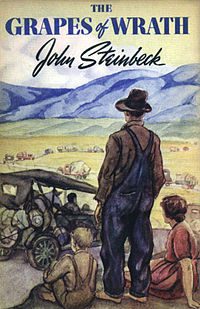John Steinbeck’s novel the Grapes of Wrath was published on this day in 1939.
It would prove to be one of the formative reads in my young life. It said some hard things about our country, about capitalism, about the rich and the poor. And by the time I had finished reading it, I realized whose side I was on.
My understanding has nuanced over the years. Today I consider myself a type of social democrat. I think business is a seedbed of creativity and absolutely creates wealth. But it has three stark shadows. First, and foremost, it is totally amoral. Without some restraints it will wreck havoc within human societies. This takes two principal directions. The first is toward monopoly, the seed of its own destruction, and along the way causing the collapse of any just society. The second is the siren of short term profit, which leads to painting rotten meat, cooking up health claims for tobacco, and pumping filth into the air even to the point of changing the climate. And, if, and for me it is, the goal, the purpose of society is in fact moral, is the furtherance of our species, and with that acknowledging our stewardship of our planet, of that ancient call to joy, to happiness articulated in those documents of an emerging universal civilization of, by, and for the people and our home, particularly as articulated within the declaration of independence, the statement of the four freedoms during the second world war, as well as the universal declaration of human rights composed shortly after the war. Here we find those things that can create the base for such a just society, freedom of opinion and expression, equal access to education, decent health care, and a safety net that says those who fail or who are infirm or old can live with dignity. And the engine that supports all this is that well regulated, energetic and highly taxed business community.
My fantasy for a society worth living in.
And the first steps toward this view probably took formation when I read Steinbeck’s masterwork. In this he showed in stark contrast the grinding poverty of people caught up in a form of capitalism that simply was about extracting profit. And, perhaps most importantly, he hinted at a spirituality that might show us a way through. I find it interesting, terribly interesting that the light Steinbeck offered was not an alternative economic system, but a spiritual perspective, an insight into who we truly are.
And it is that vision, which in part, large part, I share, that the way through becomes obvious.
Each of us precious.
All of us connected.
No exceptions…













